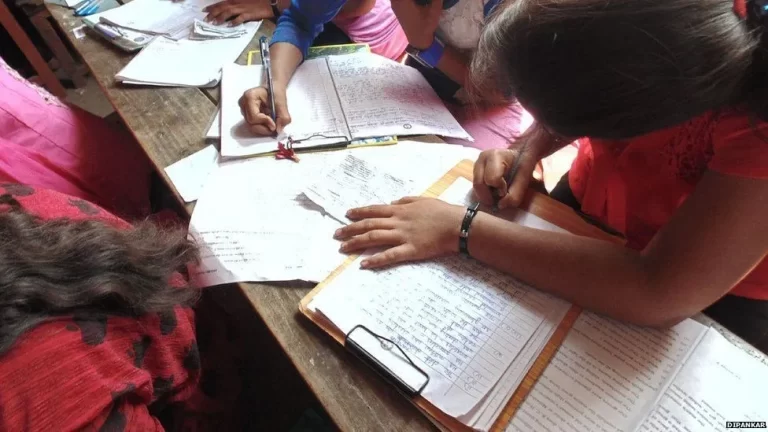India's parliament has passed a stringent new law to prevent cheating in exams for government jobs and admission to public colleges.
The Public Examinations (Prevention of Unfair Means) Act, 2024 – which was passed on Tuesday – carries a jail sentence of three to 10 years for those who facilitate cheating. It also carries a fine ranging between 1 million rupees ($12,040; £9,551) and 10 million rupees.
The new law does not impose penalties directly on test takers; instead, their punishments will be determined by the rules set forth by their respective testing authorities. The law will be applicable to most exams conducted by the federal government and its test agencies. All offences are non-bailable and will be investigated by senior police officials.
The Bharatiya Janata Party (BJP)-led government has said the act will bring “greater transparency, fairness and credibility” as it is the first federal legislation to prevent malpractices in examinations. But critics argue that severe punishment alone won't effectively address the issue, noting instances of cheating and impersonation already punishable under India's criminal laws.
“The new law could prove to be ineffective because coaching centres collude with students to help them pass entrance examination,” says Ghanta Chakrapani, former chairman of a state-run organisation which recruits people for state government jobs.
In 2022, India's top investigative agency, the Central Bureau of Investigation (CBI), arrested a Russian hacker for reportedly breaching the entrance exam for admission to the prestigious Indian Institutes of Technology (IITs). The hacker allegedly worked for a coaching institute.
Cheating is prevalent in India due to the intensely competitive nature of government jobs and top college admission tests, where millions vie for a limited number of positions.
For the Union Public Service Commission (UPSC) exam, the entrance test for the federal civil service, over a million people applied last year for just over 1,000 job vacancies. The Joint Entrance Examination (JEE), which determines admissions to IITs, sees tens of thousands of applicants annually for just over 15,000 available seats.
In response to exam manipulation, several states have implemented laws to curb cheating. Rajasthan enacted an anti-cheating law two years ago, while Andhra Pradesh and Uttar Pradesh have had such laws since 1998 and 1997, respectively. Last year, Gujarat and Uttarakhand also introduced laws to prevent cheating.

Despite the existence of these laws, cheating cases have persisted in each of these states until recently, indicating their limited effectiveness.
India also reports question paper leaks periodically, leading to cancellation of exams. An investigation by The Indian Express newspaper had found 41 documented cases of question paper leaks in job recruitment exams across 15 states over the last five years.
However, “high quantum of punishment cannot be a one stop solution for the cheating menace,” says Jacob Punnoose who worked as a top ranking officer in the Indian police service before his retirement.
Cheating can be prevented by tightening security at examination centres, Mr Punnoose says. “It's possible to use mass surveillance digital technology to prevent cheating by just monitoring students who take the examination.”
India, however, has reported an emerging trend of young candidates using inventive and mischievous ways of cheating using digital technology.
In Rajasthan some used slippers with embedded Bluetooth devices to share test answers with accomplices outside the examination hall. Recently, 30 candidates were arrested in Tamil Nadu for using Bluetooth earphones to cheat in an Indian customs service examination, reports say.
Laws targeting cheating have proven ineffective, partly due to “organised criminals” with influential connections disrupting examinations, say experts. People who facilitate cheating often have political ties. In Karnataka, a police recruitment exam was investigated last year as a governing party leader was accused of facilitating mass cheating at an examination centre, resulting in over 65 arrests.
In India, disputes over public examination results can linger for years. Two years ago, violent protests erupted over alleged inaccuracies in the results of a railway recruitment test, leading to the suspension of the exam. Some 700,000 candidates were shortlisted for just over 35,200 posts in this exam.
“The new law does not make it difficult to cheat. It just makes those caught, face stringent punishment,” Mr Chakrapani says.
— CutC by bbc.com


